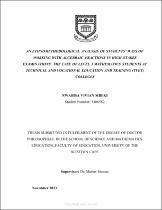| dc.contributor.advisor | Simons, Marius | |
| dc.contributor.author | Mbeki, Nwabisa Vivian | |
| dc.date.accessioned | 2024-02-14T10:58:03Z | |
| dc.date.available | 2024-02-14T10:58:03Z | |
| dc.date.issued | 2023 | |
| dc.identifier.uri | http://hdl.handle.net/11394/10648 | |
| dc.description | Philosophiae Doctor - PhD | en_US |
| dc.description.abstract | The study investigates the National Certificate Vocational (NCV) Level 3 students’ ways of working with rational algebraic fractions in a high-stakes examination. An ethnomethodological analysis was used to reveal the textures of examinees’ work. Ways of working in this study refer to how examinees deal with algebraic fractions when simplifying them, including even those elements of their work, which are rough work in the sit-down examination. Ethnomethodology is the study of ordinary actions by ordinary members of society. Ordinary action means that members regularly and recurrently do it with such automaticity that it is given little thought. Ethnomethodology is the study of how people use common sense, procedures, and considerations to gain an understanding of everyday situations (Garfinkel, 1967). In the context of mathematics education, ethnomethodology seeks to understand how examinees construe, construct and orient themselves to these norms that are usually seen but unnoticed (Garfinkel 1967). The study is premised on a qualitative research paradigm that focuses on studying situations in their natural settings and applying an interpretive perspective. Data were collected from two colleges using students’ examination scripts for the end-of-year NCV L3 mathematics exams. Guba and Lincoln’s (1985) concepts of trustworthiness, credibility, transferability, dependability, and confirmability were used. The study sought to ensure ethical principles were followed by applying to each college for permission to conduct research and collect data. Permission was granted. Ethical clearance from the University of the Western Cape was obtained before conducting any data collection. The researcher ensured confidentiality and the anonymity of the participants’ scripts. The examination guidelines require that the examination scripts and mark sheets be kept at an institution for verification and cases of appeal. The institution keeps examinees’ examination scripts, which are confidential. The researcher ensured that scripts did not leave the college and ensured the confidentiality of their information by making copies of the scripts and keeping the copies safe. The study poses no harm to the participants or the colleges. | en_US |
| dc.language.iso | en | en_US |
| dc.publisher | University of the Western Cape | en_US |
| dc.subject | Ethnomethodological analysis | en_US |
| dc.subject | NCV L2 Examinees | en_US |
| dc.subject | NCV Level 3 students | en_US |
| dc.subject | Rational algebraic fractions | en_US |
| dc.subject | TVET college | en_US |
| dc.title | An ethnomethodological analysis of students’ ways of working with algebraic fractions in high-stakes examinations: the case of level 3 mathematics students at technical and vocational education and training (tvet) colleges | en_US |
| dc.type | Thesis | en_US |
| dc.rights.holder | University of the Western Cape | en_US |

